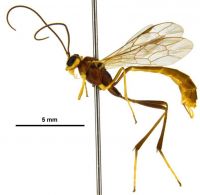ICHNEUMONIDAE: : Dusona Cameron 1901
Diagnosis:
Characteristics of Dusona include: 1. Body size 10-20mm; 2. Position of spiracle on T1 clearly behind the centre; 3. Shape of aerolet in forewing triangulate; 4. Colour of face is all black; 5. Metasoma compressed laterally; 6. Size of ocelli are small; 7. Length of antennae:is shorter than body; 8. Ovipositor is barely visible; 9. Wings present; 10. Colour of wings clear; 11. Sternaulus (on mesopleuron) is absent; 12. Shape of face in lateral view is flat or only weakly bulging; 13. Sternite on T1 extends past spiracle sometimes forming a long cylinder with tergite; 14. Shape of T1 is evenly curved; 15. Number of teeth in mandibles is 2; 16. Same colour on metasoma throughout; 17. Length of T1 subequal in length of T2; 18. Sculpture on mesoscutum is finely pitted, many hairs; 19. Width of T1 (viewed dorsally) is uniform width slightly widening posteriorly; 20. No glymma on T1; 21. Sculpture on metasoma is smooth with a semi-glossy or satin appearance at least on T2; 22. Propodeum reaching past coxal insertion, but not reaching halfway along metacoxae.Similarity to Other Taxa
Dusona are a mid-sized Ichneumonids in New Zealand. They are similar in size to: Habronyx , Liotryphron , Lissonota , Phytodietus and Venturia . They can be separated from other similar sized taxa by having the spiracle on T1 well behind the centre of T1, no glymma on T1, the face is all black, the ovipositor length very short, a triangulate areolet in the forewing, and T1 is of similar length to T2.Compare
-

Habronyx
No areolet in forewing. -

Venturia
The ovipositor length distinct but not longer than the body, metasoma bicoloured (orange/black). -

Liotryphon
Spiracle is at or before the centre of T1, T1 short and squat, ovipositor as long as body. -

Lissonota
Spiracle is at or before the centre of T1, glymma present as groove (not deep), ovipositor as long as body. -

Phytodietus
Spiracle is at or before the centre of T1, a deep glymma on T1, the ovipositor length distinct but not longer than the body, a petiolate areolet in the forewing.
Distribution in NZ
North Island: ND, AK, CL, HB, TK, WI, WO. South Island: NN, BR, MC, WD, FD, SL.
Species in NZ
Two endemic species: Dusona destructor Wahl 1991 and D. stramineipes Cameron 1901.Biology & hosts
Dusona is a large genus found worldwide, however, many species fall under the name Delopia , and there has been some confusion about the status of these names (Wahl 1991). Little is known about the biology of Dusona species in New Zealand, but D. stramineipes is a parasitoid of Xyridacma alectoraria and X. veronicae (Lepidoptera: Geometridae).Sources of information
Gauld ID 1984. An Introduction to the Ichneumonidae of Australia. London, British Museum (Natural History). 413 p.Valentine EW & Walker AK. 1991. Annotated Catalogue of New Zealand Hymenoptera. DSIR Plant Protection Report 4. General Printing Services, 84 pp.
Wahl DB. 1991. A new species of Dusona from New Zealand, and the application of Dusona vs. Delopia (Hymenoptera: Ichneumonidae, Campopleginae). Proceedings of the Entomological Society of Washington. 93:946-950.
Citation
Ward DF & Schnitzler FR. 2013. Ichneumonidae of New Zealand. Genus Dusona http://ichneumonidae.landcareresearch.co.nzAccessed: 26 April 2025


